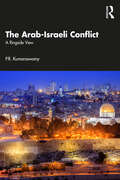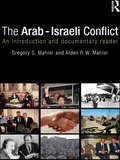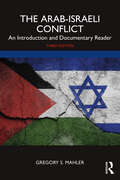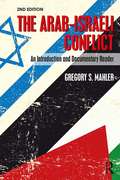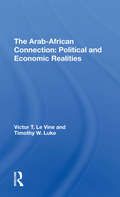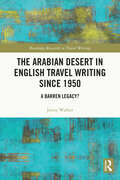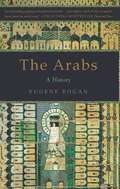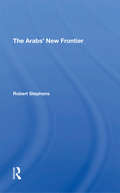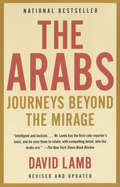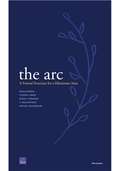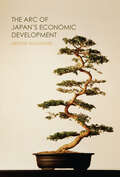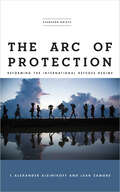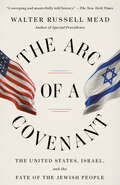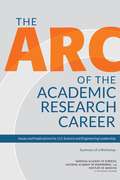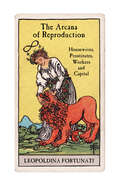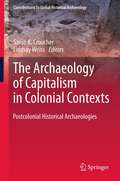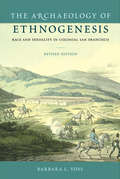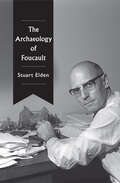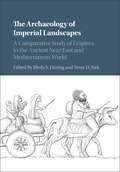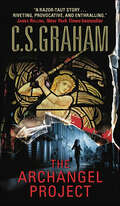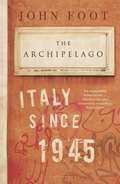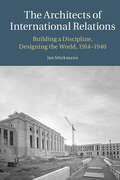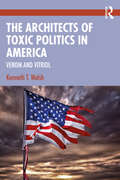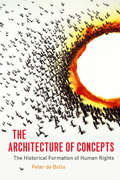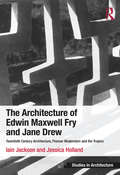- Table View
- List View
The Arab-Israeli Conflict: A Ringside View
by P.R. KumaraswamyThis book provides a holistic view of the conflict between Israel and its Arab neighbours and studies the global implications of their fraught relations. Focusing on the conflict from its beginning in the late 19th century, the author provides a well-rounded and balanced narrative by examining its religious, ideological, ethnic, political, national, regional and international dimensions. The volume covers a wide range of issues, such as the conflicting historical legacy of the city of Jerusalem, Jewish longing for a homeland, the partition of Palestine, various wars and conflicts since 1948, Palestinian resistance, the Arab Boycott of Israel and the Abraham Accords. It also tackles the contested national claims and the refugee question and looks at various peace-making efforts, including the role of external stakeholders such as the US, UK, Russia and India. A comprehensive study of the Arab-Israeli conflict, the book is richly supported by a swath of references to materials, documents, maps and video links. It will be an essential reading for students, academics and teachers of politics and international relations, national security, geopolitics, history, military and strategic studies, Middle East studies, conflict resolution and peace-making.
The Arab-Israeli Conflict: An Introduction and Documentary Reader
by Gregory S. Mahler Alden R.W. MahlerThe Arab-Israeli conflict has been one of the most protracted and contentious disputes in the Middle East. This wide-ranging textbook examines the diplomatic and historical setting within which the conflict developed, from both the Israeli and Palestinian perspectives, and gives a comprehensive overview of the peace process. Enabling students to easily access and study original documents through the supportive framework of a textbook, The Arab-Israeli Conflict: presents the seventy most important and widely cited documents in the history of the Israeli-Palestinian conflict presents these documents in an edited form to highlight key elements includes an introductory chapter which sets the context for the study of the history of the area covers a comprehensive historical period, ranging from the 19th Century to the present day incorporates a wide range of pedagogical aids: original documents, maps and boxed sections. This important textbook is an essential aid for courses on the Arab-Israeli conflict and the Middle East peace process, and will be an invaluable reference tool for all students of political science, Middle East studies and history.
The Arab-Israeli Conflict: An Introduction and Documentary Reader
by Gregory S. MahlerThis textbook examines the diplomatic and historical setting within which the Arab-Israeli conflict has developed and gives students the opportunity to study the Middle East peace process through a presentation of primary documents that have been instrumental in the development of the conflict from the mid1800s through the present. This third edition includes an updated and expanded introduction and a significant expansion of the number of documents. The Arab-Israeli Conflict: • includes an extensive introductory chapter which presents the history of the conflict and covers events from the nineteenth century to the present day • presents 120 of the most important and widely cited documents in the history of the Israeli-Palestinian conflict in an edited form to highlight key elements • incorporates a number of pedagogical aids, including the (edited) original documents, maps, and boxed sections that offer greater explanation of detailed topics • presents “both sides” of the argument, allowing students to understand both the Israeli and the Palestinian positions on the issues This important textbook is an essential aid for courses on the Arab-Israeli conflict and the Middle East peace process and will be an invaluable reference tool for all students of political science, Middle East studies, and history.
The Arab-Israeli Conflict: An Introduction and Documentary Reader, 2nd Edition
by Gregory S. MahlerThe Arab-Israeli conflict has been one of the most protracted and contentious disputes in modern history. This wide-ranging textbook examines the diplomatic and historical setting within which the conflict developed, from both the Israeli and Palestinian perspectives, and gives a comprehensive overview of the peace process. The new edition includes a fully revised and updated introduction and a wider selection of documents up to the first year of the Trump presidency. Enabling students to easily access and study original documents through the supportive framework of a textbook, The Arab-Israeli Conflict: presents over eighty of the most important and widely cited documents in the history of the Israeli-Palestinian conflict presents these documents in an edited form to highlight key elements includes an introductory chapter which sets the context for the study of the history of the area covers a comprehensive historical period, ranging from the 19th Century to the present day incorporates a wide range of pedagogical aids: original documents, maps and boxed sections. This important textbook is an essential aid for courses on the Arab-Israeli conflict and the Middle East peace process, and will be an invaluable reference tool for all students of political science, Middle East studies and history.
The Arab-african Connection: Political And Economic Realities
by Victor T Le Vine Timothy W LukeBetween June 1967 and the end of 1973, most independent Black African states abandoned their neutral position in the Middle East conflict, cut their ties with Israel, and gave full support to the political aims of the Arab states. Since the beginning of 1974, however, and despite attempts by the Arabs to shield their new allies from the adverse effects of the 1973-74 world oil and economic crises, the alliance has begun to fragment as the African states become transformed from partners to clients and dependents of the Arabs. This study examines the roots of the African conversion, the nature of the evolving relationship between the African and Arab states, and the reasons—economic and political—for the transformation of the alliance. Basic to that transformation, the authors argue, is a fundamental change in the international status and power of the Arab states, a change that has led them to cast their lot with the industrialized "First World" rather than with the poorer, less developed countries.
The Arabian Desert in English Travel Writing Since 1950: A Barren Legacy? (Routledge Research in Travel Writing)
by Jenny WalkerBroadly this book is about the Arabian desert as the locus of exploration by a long tradition of British travellers that includes T.E. Lawrence and Wilfred Thesiger; more specifically, it is about those who, since 1950, have followed in their literary footsteps. In analysing modern works covering a land greater than the sum of its geographical parts, the discussion identifies outmoded tropes that continue to impinge upon the perception of the Middle East today while recognising that the laboured binaries of "East and West", "desert and sown", "noble and savage" have outrun their course. Where, however, only a barren legacy of latent Orientalism may have been expected, the author finds instead a rich seam of writing that exhibits diversity of purpose and insight contributing to contemporary discussions on travel and tourism, intercultural representation and environmental awareness. By addressing a lack of scholarly attention towards recent additions to the genre, this study illustrates for the benefit of students of travel literature, or indeed anyone interested in "Arabia", how desert writing, under the emerging configurations of globalisation, postcolonialism and ecocriticism, acts as a microcosm of the kinds of ethical and emotional dilemmas confronting today’s travel writers in the world’s most extreme regions.
The Arabs
by Eugene RoganTo American observers, the Arab world often seems little more than a distant battleground characterized by religious zealotry and political chaos. Years of tone-deaf US policies have left the region powerless to control its own destiny-playing into a longstanding sense of shame and impotence for a once-mighty people. In this definitive account, preeminent historian Eugene Rogan traces five centuries of Arab history, from the Ottoman conquests through the British and French colonial periods and up to the present age of unipolar American hegemony. The Arab world is now more acutely aware than ever of its own vulnerability, and this sense of subjection carries with it vast geopolitical consequences. Drawing from Arab sources little known to Western readers, Rogan’sThe Arabswill transform our understanding of the past, present, and future of one of the world’s most tumultuous regions.
The Arabs' New Frontier
by Robert StephensThis book explores the Arab world and its development problems as its new oil wealth opens up prospects of accelerated economic and social progress. It describes Kuwait's aid operations and looks at the effect the sudden torrent of oil money has had on the Kuwaitis.
The Arabs: Journeys Beyond the Mirage
by David LambThe Arabs is widely considered one of the essential books for understanding the Middle East and the peoples who live there. David Lamb, who spent years as a correspondent in Cairo, explores the Arabs' religious, political, and cultural views, noting the differences and key similarities between the many segments of the Arab world. He explains Arab attitudes and actions toward the West, including the growth of terrorism, and situates current events in a larger historical backdrop that goes back more than a thousand years. Now thoroughly revised and updated, The Arabs takes the story up to 2001. Lamb analyzes the developments that led to the attacks on the World Trade Center and the Pentagon, and helps the reader to understand how things got to that point. A veteran journalist, Lamb combines his extensive experience in covering international politics with his deeply informed insider's knowledge to provide an intimate portrait of the Arab world today.
The Arc
by Steven Simon Glenn Robinson C. Ross Anthony Michael Schoenbaum Doug SuismanAn examination of options for strengthening the housing and transportation infrastructure of a potential future independent Palestinian state in the context of a large and rapidly growing Palestinian population. The book includes initial cost estimates for improving and expanding infrastructure to facilitate successful development.
The Arc of Japan's Economic Development
by Arthur AlexanderThis core textbook is the definitive overview of the Japanese economy. It charts its history from the period before the Meiji restoration and its astonishing growth throughout the twentieth century before conducting a thorough analysis of the contemporary scene and the implications of the ongoing financial crisis. Written by a leading authority in the field, this is the only book to include substantive material on post-crisis Japan and it includes key material on international trade and foreign direct investment. Timely and topical, it gives a clear overview of the Japanese economy.
The Arc of Protection: Reforming the International Refugee Regime
by T. Alexander Aleinikoff Leah ZamoreThe international refugee regime is fundamentally broken. Designed in the wake of World War II to provide protection and assistance, the system is unable to address the record numbers of persons displaced by conflict and violence today. States have put up fences and adopted policies to deny, deter, and detain asylum seekers. People recognized as refugees are routinely denied rights guaranteed by international law. The results are dismal for the millions of refugees around the world who are left with slender prospects to rebuild their lives or contribute to host communities. T. Alexander Aleinikoff and Leah Zamore lay bare the underlying global crisis of responsibility. The Arc of Protection adopts a revisionist and critical perspective that examines the original premises of the international refugee regime. Aleinikoff and Zamore identify compromises at the founding of the system that attempted to balance humanitarian ideals and sovereign control of their borders by states. This book offers a way out of the current international morass through refocusing on responsibility-sharing, seeing the humanitarian-development divide in a new light, and putting refugee rights front and center.
The Arc of a Covenant: The United States, Israel, and the Fate of the Jewish People
by Walter Russell MeadA NEW YORK TIMES BEST BOOK OF THE YEAR • A groundbreaking work that overturns the conventional understanding of the Israeli-American relationship and, in doing so, explores how fundamental debates about American identity drive our country's foreign policy.In this bold examination of the Israeli-American relationship, Walter Russell Mead demolishes the myths that both pro-Zionists and anti-Zionists have fostered over the years. He makes clear that Zionism has always been a divisive subject in the American Jewish community, and that American Christians have often been the most fervent supporters of a Jewish state, citing examples from the time of J.P. Morgan and John D. Rockefeller to the present day.He spotlights the almost forgotten story of left-wing support for Zionism, arguing that Eleanor Roosevelt and liberal New Dealers had more influence on President Truman's Israel policy than the American Jewish community--and that Stalin's influence was more decisive than Truman's in Israel's struggle for independence. Mead shows how Israel's rise in the Middle East helped kindle both the modern evangelical movement and the Sunbelt coalition that carried Reagan into the White House. Highlighting the real sources of Israel's support across the American political spectrum, he debunks the legend of the so-called "Israel lobby." And, he describes the aspects of American culture that make it hostile to anti-Semitism and warns about the danger to that tradition of tolerance as our current culture wars heat up.With original analysis and in lively prose, Mead illuminates the American-Israeli relationship, how it affects contemporary politics, and how it will influence the future of both that relationship and American life.
The Arc of the Academic Research Career
by Institute of Medicine National Academy Of Sciences Beryl Lieff Benderly National Academy of Engineering Committee on Science, Engineering, and Public Policy Policy and Global AffairsAmerica's research universities have undergone striking change in recent decades, as have many aspects of the society that surrounds them. This change has important implications for the heart of every university: the faculty. To sustain their high level of intellectual excellence and their success in preparing young people for the various roles they will play in society, universities need to be aware of how evolving conditions affect their ability to attract the most qualified people and to maximize their effectiveness as teachers and researchers. Gender roles, family life, the demographic makeup of the nation and the faculty, and the economic stability of higher education all have shifted dramatically over the past generation. In addition, strong current trends in technology, funding, and demographics suggest that change will continue and perhaps even accelerate in academe in the years to come. One central element of academic life has remained essentially unchanged for generations, however: the formal structure of the professorial career. Developed in the mid-nineteenth and early twentieth centuries to suit circumstances quite different from today's, and based on traditions going back even earlier, this customary career path is now a source of strain for both the individuals pursuing it and the institutions where they work. The Arc of the Academic Research Career is the summary of a workshop convened by The Committee on Science, Engineering, and Public Policy in September 2013 to examine major points of strain in academic research careers from the point of view of both the faculty members and the institutions. National experts from a variety of disciplines and institutions discussed practices and strategies already in use on various campuses and identified issues as yet not effectively addressed. This workshop summary addresses the challenges universities face, from nurturing the talent of future faculty members to managing their progress through all the stages of their careers to finding the best use of their skills as their work winds down.
The Arcana of Reproduction: Housewives, Prostitutes, Workers and Capital
by Leopoldina FortunatiThe definitive feminist analysis of reproductive and &‘caring&’ labor to emerge from Italian feminism of the 1970sEmerging from the great social upheavals that contested the sexual and racial divisions of labor globally in the 1970s, Leopoldina Fortunati&’s classic work expands and transforms how we analyze the sphere of reproduction, redefining the value of the individual&’s life and the labor performed in the home.Released here for the first time in its unabridged form with historical notation and contemporary commentary, The Arcana of Reproduction is a foundational text and essential contribution to today&’s discussions of social reproduction and the history of Italian feminism. Fortunati&’s work provides some of the earliest theorizations of &‘immaterial,&’ &‘affective,&’ and &‘caring&’ labor, and of the role of technology in reproduction, articulated decades before their popular reception in English academic literature.Reading this work some 50 years after its original publication gives us the tools to analyze the contemporary state of capitalist development and of women&’s lives today. The text remains prefigurative and essential in our era of digital labor.
The Archaeology of Capitalism in Colonial Contexts
by Sarah K. Croucher Lindsay WeissThe Archaeology of Capitalism in Colonial Contexts: Postcolonial Historical Archaeologies explores the complex interplay of colonial and capital formations throughout the modern world. The authors present a critical approach to this topic, trying to shift discourses in the theoretical framework of historical archaeology of capitalism and colonialism through the use of postcolonial theory. This work does not suggest a new theoretical framework as such, but rather suggests the importance of revising key theoretical terms employed within historical archaeology, arguing for new engagements with postcolonial theory of relevance to all historical archaeologists as the field de-centers from its traditional locations. Examining case studies from North America, South America, the Caribbean, Africa, Australia, the Middle East, and Europe, the chapters offer an unusually broad ranging geography of historical archaeology, with each focused on the interplay between the particularisms of colonial structures and the development of capitalism and wider theoretical discussions. Every author also draws attention to the ramifications of their case studies in the contemporary world. With its cohesive theoretical framework this volume is a key resource for those interested in decolonizing historical archaeology in theory and praxis, and for those interested in the development of modern global dynamics.
The Archaeology of Ethnogenesis: Race and Sexuality in Colonial San Francisco
by Barbara L. Voss“Compelling new evidence, careful documentation, and an artfully woven narrative make The Archaeology of Ethnogenesis a path-breaking book for sociocultural scholars as well as for general readers interested in the politics of identity, ethnicity, gender, and the colonial and U.S. Western history.”—Transforming Anthropology “Voss’s lucid explanations of method and theory make the book accessible to a broad range of audiences, from upper-level undergraduate and graduate students to professionals and lay audiences. . . . Its interdisciplinarity, indeed, may help to sell archaeology to audiences who do not typically consider archaeological evidence as an option for identity studies.”—Current Anthropology “The book reminds historians that other disciplines can offer fruitful methodological forays into well-trodden areas of study.”—Journal of American History “Those scholars studying various aspects of the Hispanic worldwide empire would be well advised to peruse Voss’s work.”—Historical Archaeology “[W]ell written, theoretically sophisticated, and unburdened by abstract concepts or hyper-qualified verbiage.”—H-Net Reviews “[E]ngaging. Overall, the text belongs in the library of every student of Spanish and Mexican Alta California. . . . The Archaeology of Ethnogenesis will become an anthropological standard.”—Journal of California and Great Basin Anthropology “[A] must-read for all interested not only in colonial California, but for all historical archaeologists and to any archaeologist interested in the examination of identities.”—Cambridge Archaeological Journal “Shows how individuals negotiate ethnic identity through everyday objects and actions.”—SMRC Revista In this interdisciplinary study, Barbara Voss examines religious, environmental, cultural, and political differences at the Presidio of San Francisco, California, to reveal the development of social identities within the colony. Voss reconciles material culture with historical records, challenging widely held beliefs about ethnicity.
The Archaeology of Foucault
by Stuart EldenOn 20 May 1961 Foucault defended his two doctoral theses; on 2 December 1970 he gave his inaugural lecture at the Collège de France. Between these dates, he published four books, travelled widely, and wrote extensively on literature, the visual arts, linguistics, and philosophy. He taught both psychology and philosophy, beginning his explorations of the question of sexuality. Weaving together analyses of published and unpublished material, this is a comprehensive study of this crucial period. As well as Foucault’s major texts, it discusses his travels to Brazil, Japan, and the USA, his time in Tunisia, and his editorial work for Critique and the complete works of Nietzsche and Bataille. It was in this period that Foucault developed the historical-philosophical approach he called ‘archaeology’ – the elaboration of the archive – which he understood as the rules that make possible specific claims. In its detailed study of Foucault’s archive the book is itself an archaeology of Foucault in another sense, both excavation and reconstruction. This book completes a four-volume series of major intellectual histories of Foucault. Foucault’s Last Decade was published by Polity in 2016; Foucault: The Birth of Power followed in 2017; and The Early Foucault in 2021.
The Archaeology of Imperial Landscapes: A Comparative Study Of Empires In The Ancient Near East And Mediterranean World
by Bleda S. Düring Tesse D. StekThe Archaeology of Imperial Landscapes examines the transformation of rural landscapes and societies that formed the backbone of ancient empires in the Near East and Mediterranean. Through a comparative approach to archaeological data, it analyses the patterns of transformation in widely differing imperial contexts in the ancient world. Bringing together a range of studies by an international team of scholars, the volume shows that empires were dynamic, diverse, and experimental polities, and that their success or failure was determined by a combination of forceful interventions, as well as the new possibilities for those dominated by empires to collaborate and profit from doing so. By highlighting the processes that occur in rural and peripheral landscapes, the volume demonstrates that the archaeology of these non-urban and literally eccentric spheres can provide an important contribution to our understanding of ancient empires. The 'bottom up' approach to the study of ancient empires is crucial to understanding how these remarkable socio-political organisms could exist and persist.<P><P> Introduces a shift from classificatory approaches to ancient empires.<P> Provides a bottom up study of ancient empires and their hinterlands.<P> Presents a comparative archaeology of ancient empires that shows why empires are a meaningful category and how a comparative study of them is feasible by focusing on marginal and rural areas. <P>
The Archangel Project
by C.S. Graham“As current as today’s headlines and as disturbing as your darkest nightmare . . . Riveting, provocative, and enthralling.” —James Rollins, #1 New York Times–bestselling author A murdered psychologist with ties to a secret CIA-funded remote viewing project . . .A haunted young Iraq War vet with a “psycho” discharge and a talent that has marked her for death . . .A deadly secret that will rock the world.You can’t hide the truth from those who can see.When the charred remains of Tulane professor Henry Youngblood are discovered in the burned-out ruins of his New Orleans offices, the CIA sends maverick troubleshooter Jax Alexander to investigate. Joined in a reluctant partnership with remote viewer October “Tobie” Guinness, Jax struggles to decipher a cryptic set of clues that leads from the devastated neighborhoods of New Orleans to the power corridors of Washington, D.C. Pursued by agents of an influential oil and defense conglomerate with ties to the President himself, Jax and Tobie soon find themselves in a breakneck race against time to stop a ruthless killer and avert a diabolical plot that could devastate America.“An engaging premise, smart and exhilarating. An electrifying ride that rings with authenticity. No question, this is an auspicious beginning for C. S. Graham.” —Steve Berry, New York Times–bestselling author “[A] rollicking suspense novel. . . Conspiracy fans will love this impressive series opener.” —Publishers Weekly (starred review)“The pace of the plot in this book is blistering . . . It’ll keep you turning pages.” —The Advocate
The Archipelago: Italy Since 1945
by John FootIn The Archipelago, acclaimed historian John Foot chronicles Italy's tumultuous history from the post-war period to the present. From the silent assimilation of fascists into society after 1945 to the troubling reign of Silvio Berlusconi, and from the artistic peak of neorealist cinema to the celebration of Italy's 150th birthday in 2011, he examines both the corrupt and celebrated sides of the country. <p><p> While often portrayed as a failed state on the margins of Europe, Italy has instead been at the centre of innovation and change – a political laboratory. Through stories of trials, TV programmes, songs and football matches, moments of violence and beauty, epochal social transformation and suffocating continuities, this new history tells the fascinating story of a country always marked by scandal but with the constant ability to re-invent itself. <p> Comprising original research and lively insights, The Archipelago chronicles the crises and modernisations of over seventy years of post-war Italy, from its fields, factories, squares and housing estates to the political intrigue of Rome.
The Architects of International Relations: Building a Discipline, Designing the World, 1914-1940
by Jan StöckmannBased on extensive archival research, this book provides a new and stimulating history of International Relations (IR) as an academic discipline. Contrary to traditional accounts, it argues that IR was not invented by Anglo-American men after the First World War. Nor was it divided into neat theoretical camps. To appreciate the twists and turns of early IR scholarship, the book follows a diverse group of men and women from across Europe and beyond who pioneered the field since 1914. Like architects, they built a set of institutions (university departments, journals, libraries, etc.) but they also designed plans for a new world order (draft treaties, petitions, political commentary, etc.). To achieve these goals, they interacted closely with the League of Nations and its bodies for intellectual cooperation, until the Second World War put an end to their endeavour. Their story raises broader questions about the status of IR well beyond the inter-war period.
The Architects of Toxic Politics in America: Venom and Vitriol
by Kenneth T. WalshThe Architects of Toxic Politics in America: Venom and Vitriol explains the history of poison politics in America by profiling some of the key political “attack dogs” who have shaped the modern landscape.Comparing and contrasting the Trump and Biden presidencies with administrations of the past, the book explains the unique character of the current toxic political moment and the forces that have created it. The book also focuses quite extensively on “non-presidential” architects of toxic politics: other politicians, campaign strategists, activists, and media figures (and a few key figures that have fulfilled two or more of these roles). Drawing on his long career as a journalist specializing in presidential coverage, Kenneth T. Walsh argues that due to the complex, often conflicting nature of American government, the angriest, most decisive voices can command media, voter, and legislative attention and thereby maintain and consolidate power. This results in frustration, alienation, and cynicism—and ultimately, a diminishment of voter participation that can reinforce the vicious cycle and lead to electoral disaster.For anyone interested in politics, media, and the culture of “gotcha” journalism, this book will also be a valuable addition to undergraduate and graduate courses on politics, the presidency, political and media ethics, campaign history and government.
The Architecture of Concepts: The Historical Formation of Human Rights
by Peter de BollaThe Architecture of Concepts proposes a radically new way of understanding the history of ideas. Taking as its example human rights, it develops a distinctive kind of conceptual analysis that enables us to see with precision how the concept of human rights was formed in the eighteenth century.The first chapter outlines an innovative account of concepts as cultural entities. The second develops an original methodology for recovering the historical formation of the concept of human rights based on data extracted from digital archives. This enables us to track the construction of conceptual architectures over time.Having established the architecture of the concept of human rights, the book then examines two key moments in its historical formation: the First Continental Congress in 1775 and the publication of Tom Paine’s Rights of Man in 1792. Arguing that we have yet to fully understand or appreciate the consequences of the eighteenth-century invention of the concept “rights of man,” the final chapter addresses our problematic contemporary attempts to leverage human rights as the most efficacious way of achieving universal equality.
The Architecture of Edwin Maxwell Fry and Jane Drew: Twentieth Century Architecture, Pioneer Modernism and the Tropics (Ashgate Studies in Architecture)
by Iain Jackson Jessica HollandMaxwell Fry and Jane Drew were pioneers of Modern Architecture in Britain and its former colonies from the late 1920s through to the early 1970s. As a barometer of twentieth century architecture, their work traces the major cultural developments of that century from the development of modernism, its spread into the late-colonial arena and finally, to its re-evaluation that resulted in a more expressive, formalist approach in the post-war era. This book thoroughly examines Fry and Drew's highly influential 'Tropical Architecture' in West Africa and India, whilst also discussing their British work, such as their post World War II projects for the Festival of Britain, Harlow New Town, Pilkington Brothers’ Headquarters and Coychurch Crematorium. It highlights the collaborative nature of Fry and Drew's work, including schemes undertaken with Elizabeth Denby, Walter Gropius, Denys Lasdun, Pierre Jeanneret and Le Corbusier. Positioning their architecture, writing and educational endeavours within a wider context, this book illustrates the significant artistic and cultural contributions made by Fry and Drew throughout their lengthy careers.
